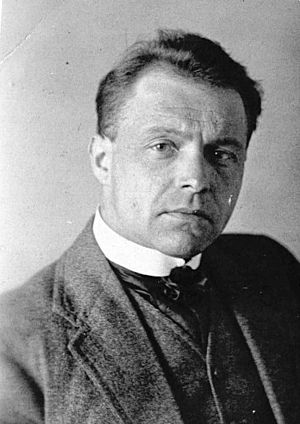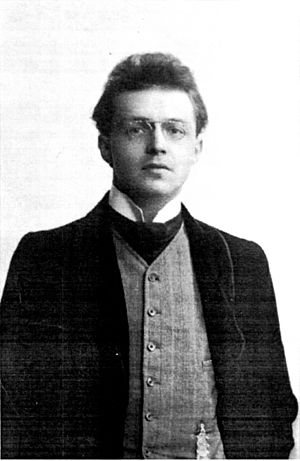Aloys Fleischmann (Senior) facts for kids
Aloys Georg Fleischmann (born April 24, 1880 – died January 3, 1964) was a talented German composer, a organist who played at cathedrals, and a choirmaster who led choirs. He created many musical pieces and helped teach music to others.
Contents
Early Life and Education
Aloys Fleischmann was born in Dachau, which was part of the German Empire at the time. He was the only child of Alois Fleischmann, a shoemaker who also helped start the local choir called Liedertafel.
From 1887 to 1894, Aloys went to primary school in Dachau. He also took private lessons in music, music theory (how music works), and Latin. In 1896, he was accepted into a special two-year course at the Royal Academy of Music in Munich. After passing his entrance exam, he studied there from 1898 to 1901. He focused on playing the organ, conducting (leading musical groups), and composition (creating music). He finished his studies with top honors in all his subjects.
Music Career in Dachau
In January 1902, Aloys Fleischmann became the organist and choirmaster at St. Jakob's parish church in Dachau. He started a choir school and a music school there. At these schools, children could learn music and buy instruments for very little money.
He worked with musician friends from Munich and artists from Dachau to bring back a local tradition: Christmas children's festivals. From 1903 to 1906, he wrote music for a new nativity play every year. In 1905, he created his famous play called Die Nacht der Wunder (The Night of Wonders). It was based on a story by Selma Lagerlöf. Artists helped design the stage and costumes. Musicians from Dachau and even members of the Munich court orchestra and choir performed in the play. The Night of Wonders was a huge success and was even reviewed in newspapers in New York!
Moving to Ireland
In 1905, Fleischmann married Tilly Swertz, an Irish pianist. She had also just graduated from the Royal Academy of Music in Munich. Tilly's parents had moved from Dachau to Cork, Ireland, in 1879. Her father, Hans Conrad Swertz, became the organist and choirmaster at the Catholic Cathedral of St Mary and St Anne in Cork.
In 1906, Aloys Fleischmann took over his father-in-law's job in Cork. He worked there until 1961, when his health declined.
During World War I, because Aloys was a German citizen, the British government considered him an "enemy alien." This meant he was seen as a foreigner from a country they were fighting. He was held in special camps starting in January 1916. First, he was in Oldcastle, County Meath, and then from 1918, he was on the Isle of Man. In 1919, he was sent back to Germany. He was finally allowed to return to Ireland in September 1920.
After Ireland became an independent country (the Irish Free State), Aloys Fleischmann took on new roles. From 1920 to 1958, he taught singing and piano at St Finbarr's College, a school for future priests in Cork. From 1922 to 1937, he was a professor of harmony (how musical notes fit together) and choral singing at the Cork School of Music.
As a church musician and music teacher, Fleischmann greatly influenced many young Irish composers and musicians. One of his students was Seán Ó Riada, who later became a very important Irish composer. Ó Riada even dedicated some of his songs to Fleischmann in 1964. Aloys and Tilly Fleischmann were also friends with famous composers like Arnold Bax and E. J. Moeran.
Aloys Fleischmann passed away in Cork, Ireland, at the age of 83. His son, also named Aloys Fleischmann (Junior), also became a well-known composer.
Musical Works
Aloys Fleischmann created over 500 musical pieces. Most of them were never officially published. His works included music for plays, religious and non-religious songs, instrumental music, and nearly 100 Lieder (German art songs). His nativity play, Die Nacht der Wunder (The Night of Wonders), was especially famous. This play helped start a tradition of similar Easter and nativity plays, like those created by the composer Carl Orff.
Remembering His Work
In 2010, there were three special exhibitions to celebrate the lives and work of Aloys and Tilly Fleischmann. These exhibitions were held at the Cork City Central Library, the Cork Public Museum, and the Bezirksmuseum Dachau (Dachau District Museum).
 | Madam C. J. Walker |
 | Janet Emerson Bashen |
 | Annie Turnbo Malone |
 | Maggie L. Walker |



